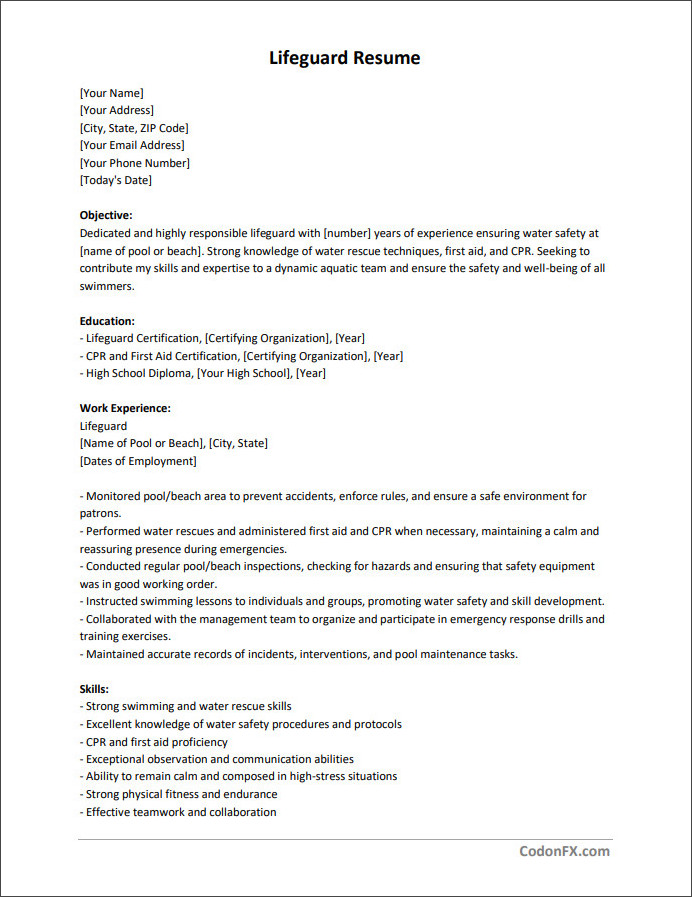
Does the lifeguard look good on the resume?
Having lifeguard experience can definitely make your resume stand out in certain situations. Lifeguarding requires a unique set of skills and qualities that can be highly valued by employers.
- Being a lifeguard requires strong communication and teamwork skills, as you need to effectively communicate with colleagues and patrons to ensure their safety. This demonstrates your ability to work well in a team and handle stressful situations calmly.
- Lifeguarding also showcases your ability to remain calm under pressure and make quick decisions in emergency situations. These qualities are highly transferable to many other industries and can make you an attractive candidate for various job roles.
- Being a lifeguard demonstrates your ability to take on responsibility and handle high-pressure situations. Lifeguards are trusted with the safety of others and are required to make split-second decisions that can be a matter of life and death. This level of responsibility can show potential employers that you are reliable, trustworthy, and can handle high-stress situations effectively.
- Lifeguarding also requires physical fitness and the ability to stay alert for long periods of time, which can be seen as positive attributes for employers looking for individuals who are proactive and dedicated to their work.
What is a lifeguard resume?
A lifeguard resume is a document that outlines a lifeguard’s qualifications, skills, and experience. It serves as a tool for lifeguards to showcase their abilities and increase their chances of obtaining a lifeguarding position. The purpose of a lifeguard resume is to provide potential employers with an overview of the candidate’s relevant qualifications and achievements. By including information such as certifications, training, and previous lifeguarding experience, a lifeguard resume helps employers assess the candidate’s suitability for the role.
One of the main benefits of having a well-crafted lifeguard resume is that it allows lifeguards to stand out from other applicants. With the high demand for lifeguards in various settings such as swimming pools, beaches, and water parks, a strong resume can make a significant difference in the hiring process. Employers often receive numerous applications for lifeguard positions, and a well-written resume can capture their attention and make a positive impression. Additionally, a lifeguard resume helps employers match the candidate’s skills and qualifications to the specific requirements of the position, ensuring a better fit for the job.
Furthermore, a lifeguard resume is also a reference tool during the interview stage. Employers may use the information provided in the resume to ask questions and further assess the candidate’s suitability for the role. By including details about their lifeguarding experience, rescue techniques, and knowledge of CPR and first aid, candidates can demonstrate their expertise and dedication to ensuring the safety of others.
What should a lifeguard put on a resume?
Here are some key items that a lifeguard should include on their resume:
- Certifications: Lifeguards should prominently mention any certifications they hold, such as First Aid, CPR, AED, and lifeguard training. These certifications demonstrate that you have the necessary skills and knowledge to respond to emergencies and provide assistance to swimmers.
- Experience: Include details about your previous lifeguarding experience, such as the name of the facility or pool where you worked, the duration of your employment, and your specific responsibilities. Highlight any achievements or special projects you were involved in, such as organizing swimming lessons or successfully rescuing a swimmer in distress.
- Skills: Lifeguarding requires a range of skills beyond swimming and rescue techniques. Include strong observational abilities, excellent communication and interpersonal skills, the ability to remain calm under pressure, and a strong understanding of water safety protocols.
- Physical Fitness: Lifeguards need to be physically fit and capable of performing their duties effectively. Mention any relevant physical fitness certifications or activities you participate in to maintain your fitness level, such as swimming, running, or attending fitness classes.
- Education: Include your educational background, focusing on any coursework or degrees related to lifeguarding, water safety, or emergency response. This information helps to demonstrate your commitment to ongoing learning and professional development.
- References: It is important to provide references from previous employers or supervisors who can vouch for your skills and work ethic. Include their contact information and let them know in advance that they may be contacted for a reference.
Including these key elements on your lifeguard resume will help potential employers understand your qualifications and suitability for the role. Tailor your resume to highlight your specific skills and experiences that align with the requirements of the position you are applying for.
Lifeguard Resume Template – Word
Lifeguard Resume Template – PDF